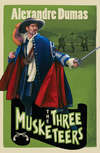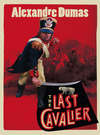Czytaj książkę: «The War of Women. Volume 1», strona 18
VIII
It was an even more melancholy journey for Canolles than he had anticipated. The most carefully guarded prisoner has a false feeling of freedom in the saddle, but the saddle was soon succeeded by a carriage, a leathern affair, the shape of which and its capacity for jolting are still retained in Touraine. Furthermore, Canolles' knees were interlocked with those of a man with the beak of an eagle, whose hand rested lovingly on the butt of a pistol. Sometimes, at night, for he slept during the day, he hoped to be able to elude the vigilance of this new Argus; but beside the eagle's beak were two great owl's-eyes, round, flaming, and most excellently adapted for nocturnal observations, so that, turn which way he would, Canolles would always see those two round eyes gleaming in that direction.
While he slept, one of the two eyes also slept, but only one. Nature had endowed this man with the faculty of sleeping with one eye open.
Two days and two nights Canolles passed in gloomy reflections; for the fortress of Île Saint-Georges – an inoffensive fortress enough, by the way – assumed terrifying proportions in the prisoner's eyes, as fear and remorse sank more deeply into his heart.
Remorse, because he realized that his mission to Madame la Princesse was a confidential mission, which he had made the most of to further his own interests, and that he had committed a terrible indiscretion on that occasion. At Chantilly, Madame de Condé was simply a fugitive. At Bordeaux, Madame de Condé was a rebel princess. Fear, because he knew by tradition the appalling vengeance of which Anne of Austria, in her wrath, was capable.
There was another source of perhaps even keener remorse than that we have mentioned. There was, somewhere in the world, a young woman, a beautiful, clever young woman, who had used her great influence solely to put him forward; a woman who, through her love for him, had again and again imperilled her position, her future, her fortune; and that woman, not only the most charming of mistresses, but the most devoted of friends, he had brutally abandoned, without excuse, at a time when her thoughts were busy with him, and instead of revenging herself upon him she had persistently bestowed additional tokens of her favor upon him; and her voice, instead of sounding reproachfully in his ears, had never lost the caressing sweetness of an almost regal favor. It is true that that favor had come to him at an inauspicious moment, at a moment when Canolles would certainly have preferred disgrace; but was that Nanon's fault? Nanon had looked upon that mission to his Majesty as a method of augmenting the fortune and worldly position of the man with whom her mind was constantly filled.
All those who have loved two women at once, – and I ask pardon of my lady-readers, but this phenomenon, which they find it so hard to understand, because they never have but one love, is very common among us men, – all those who have loved two women at once, I say, will understand that as Canolles reflected more and more deeply, Nanon recovered more and more of the influence over his mind which he thought she had lost forever. The harsh asperities of character which wound one in the constant contact of daily intercourse, and cause momentary irritation, are forgotten in absence; while, on the other hand, certain sweeter memories resume their former intensity with solitude. Fair and lost to him, kind and ill-treated, – in such guise did Nanon now appear to Canolles.
The fact was that Canolles searched his own heart ingenuously, and not with the bad grace of those accused persons who are forced to a general confession. What had Nanon done to him that he should abandon her? What had Madame de Cambes done that he should follow her? What was there so fascinating and lovable in the little cavalier of the Golden Calf? Was Madame de Cambes so vastly superior to Nanon? Are golden locks so much to be preferred to black that one should be a perjured ingrate to his mistress, and a traitor to his king, all for the sake of exchanging black locks for golden? And yet, oh, pitiable human nature! Canolles brought all these eminently sensible arguments to bear upon himself, but Canolles was not convinced. The heart is full of such mysteries, which bring happiness to lovers and despair to philosophers. All this did not prevent Canolles from hating himself, and berating his own folly soundly.
"I am going to be punished," he said, thinking that the punishment effaces the crime; "I am going to be punished, and so much the better. I suppose I shall have to do with some very rough-spoken, very insolent, very brutal captain, who will read to me, from the supreme height of his dignity as jailer-in-chief, an order from Monsieur de Mazarin, who will point out a dungeon for me, and will send me to forgather with the rats and toads fifteen feet underground, while I might have lived in the light, and flourished in the sun's rays, in the arms of a woman who loved me, whom I loved, and whom it may be that I still love. Cursed little viscount! why need you have served as envelope to such a fascinating viscountess? But is there anywhere in all the world a viscountess who is worth what this particular one is likely to cost me? For it's not simply the governor, and the dungeon fifteen feet under ground; if they think me a traitor, they won't leave matters half-investigated; they will pick a quarrel with me about that Chantilly affair, which I could not pay too heavy a penalty for, if it had been more fruitful of results for me; but it has brought me in just three kisses upon her hand. Triple idiot, when I had the power, not to use it! Poor fool! as Monsieur de Mazarin says, – to be a traitor, and not collect the pay for his treason! Who will pay me now?"
Canolles shrugged his shoulders contemptuously in reply to this mental question.
The man with the round eyes, clear-sighted as he was, could not understand this pantomime, and gazed at him in amazement.
"If they question me," Canolles continued, "I'll not answer; for what answer can I make? That I was not fond of Monsieur de Mazarin? In that case I was under no obligation to enter his service. That I did love Madame de Cambes? A fine reason that to give a queen and a first minister! So I won't reply at all. But these judges are very sensitive fellows; when they ask questions they like to be answered. There are brutal wedges in these provincial jails; they'll shatter my slender knees, of which I was so proud, and send me back to my rats and my toads a perfect wreck. I shall be bandy-legged all my life, like Monsieur le Prince de Conti, and that would make me extremely ugly, even supposing that his Majesty would cover me with his wing, which he will take good care not to do."
Besides the governor and the rats and toads and wedges, there were certain scaffolds whereon rebels were beheaded, certain gallows whereon traitors were hanged, and certain drill grounds where deserters were shot. But all this was of small consequence to a well-favored youth like Canolles, in comparison with bandy legs.
He resolved, therefore, to keep his mind clear and to question his companion upon the subject.
The round eyes, the eagle's beak, and the frowning expression of that personage gave him but slight encouragement to accost him. However, no matter how stolid a man's face may be, it must soften a little at times, and Canolles took advantage of an instant when a grimace resembling a smile passed across the features of the subaltern who watched him so sharply.
"Monsieur!" said he.
"Monsieur?" was the reply.
"Excuse me if I take you away from your reflections."
"Make no excuses, monsieur, for I never reflect."
"The devil! you are surely endowed with a fortunate mental organization, monsieur."
"And therefore I never complain."
"Ah, well, you're not like me in that; for I am very much inclined to complain."
"Of what, monsieur?"
"Because I was arrested just when I was least expecting it, to be taken I don't know where."
"Oh! yes, monsieur, you do know, for you were told."
"So I was. We are going to Île Saint-Georges, aren't we?"
"Precisely."
"Do you think I shall remain there long?"
"I have no idea, monsieur; but from the way in which you were recommended, I think it's likely."
"Oho! Is it a very forbidding place, this Île Saint-Georges?"
"Don't you know the fortress?"
"On the inside, no; I have never been inside."
"It's not very attractive, monsieur; and, aside from the governor's apartments, which have been newly furnished and are very pleasant, as I am informed, it's rather a gloomy abode."
"Very good. Do you suppose they will question me?"
"It's the custom."
"And suppose I don't answer?"
"Suppose you don't answer?"
"Yes."
"The devil! in that case there's the torture, you know."
"Ordinary?"
"Ordinary or extraordinary, according to the charge. What is the charge against you, monsieur?"
"Why," said Canolles, "I am much afraid that I am accused of offences against the State."
"Oho! in that case you will enjoy the extraordinary torture. Ten pots – "
"What's that? ten pots?"
"Yes."
"What do you mean?"
"I mean that you will have the ten pots of water poured down your throat."
"So the torture by water is in vogue at Île Saint-Georges, is it?"
"Dame! monsieur, you understand that on the Garonne – "
"To be sure, where the water is right at hand. How many pailfuls in the ten pots?"
"Three to three and a half."
"I shall swell up in that case."
"A little. But if you take the precaution to arrange matters with the jailer – "
"What then?"
"You will have an easy time of it."
"In what does the service that the jailer has it in his power to render me consist, I beg to know?"
"He can give you oil to drink."
"Is oil a specific?"
"Of sovereign efficacy."
"Do you think so?"
"I speak from experience. I have drunk (bu) – "
"You have drunk?"
"Pardon me; I meant to say, I have seen (vu). The habit of talking with Gascons makes me pronounce v like b sometimes, and vice versa."
"You were saying," said Canolles, unable to repress a smile, notwithstanding the gravity of the conversation, – "you were saying that you had seen – ?"
"Yes, monsieur, I have seen a man drink the ten pots of water with great facility, thanks to the oil which he had taken to put the canals in proper condition. To be sure, he swelled up, as they all do; but with a good fire they disinflated him without much damage. That is the essential thing in the second part of the operation. Be sure and remember these words: to heat without burning."
"I understand," said Canolles. "Mayhap monsieur was the executioner?"
"No, monsieur," replied his interlocutor, with courtesy seasoned with modesty.
"His assistant, perhaps?"
"No, monsieur; an onlooker, simply."
"Ah! and monsieur's name is – ?"
"Barrabas."
"A fine name, an old name, too; made famous in the Scriptures."
"In the Passion, monsieur."
"That's what I meant; but from habit I used the other expression."
"Monsieur prefers to say 'the Scriptures.' Is monsieur a Huguenot?"
"Yes, but a very ignorant Huguenot. Would you believe that I know hardly three thousand verses of the Psalms?"
"Indeed, it is very little."
"I succeeded better in remembering the music. There has been much hanging and burning in my family."
"I hope that no such fate is in store for monsieur."
"No, there is a much more tolerant spirit to-day; they will submerge me probably, nothing more."
Barrabas began to laugh.
Canolles' heart leaped for joy; he had won over his keeper. If this jailer ad interim should become his permanent jailer, he stood a fair chance to obtain the oil; he determined, therefore, to take up the conversation where he had left it.
"Monsieur Barrabas," said he, "are we destined to be soon separated, or shall you do me the honor to continue to bear me company?"
"Monsieur, when we arrive at Île Saint-Georges, I shall be obliged, I deeply regret to say, to leave you; I must return to our company."
"Indeed; do you belong to a company of archers?"
"No, monsieur, to a company of soldiers."
"Levied by the minister?"
"No, monsieur, by Captain Cauvignac, the same man who had the honor of arresting you."
"Are you in the king's service?"
"I think so, monsieur."
"What the devil do you mean by that? Are you not sure?"
"One is sure of nothing in this world."
"Well, if you are in doubt there is one thing that you should do, in order to set your doubts at rest."
"What is that?"
"Let me go."
"Impossible, monsieur."
"But I will pay you handsomely for your kindness."
"With what?"
"Pardieu! with money,"
"Monsieur has none."
"I have no money?"
"No."
Canolles hastily felt in his pockets.
"Upon my word, my purse has disappeared," he said. "Who has taken my purse?"
"I, monsieur," replied Barrabas with a low bow.
"Why did you do it?"
"So that monsieur could not corrupt me."
Canolles stared at the honest keeper in open-mouthed admiration, and as the argument seemed to admit of no reply, he made none.
The result was that the travellers relapsed into silence, and the journey, as it drew near its close, resumed the depressing characteristics which marked its beginning.
IX
Day was breaking when the clumsy vehicle reached the village nearest to its island destination. Canolles, feeling that it had ceased to move, passed his head through the little loophole intended to furnish air to those who were free, and conveniently arranged to shut it off from prisoners.
A pretty little village, consisting of some hundred houses grouped about a church on a hillside, and overlooked by a château, was sharply outlined in the clear morning air, gilded by the first rays of the sun, which put to flight the thin, gauzy patches of vapor.
Just then the wagon started on up the incline, and the coachman left the box and walked beside the vehicle.
"My friend," said Canolles, "are you of this province?"
"Yes, monsieur, I am from Libourne."
"In that case you should know this village. What is yonder white house, and those pretty cottages?"
"The château, monsieur," was the reply, "is the manor house of Cambes, and the village is one of its dependencies."
Canolles started back, and his face instantly changed from the deepest red to deathly white.
"Monsieur," interposed Barrabas, whose round eye nothing escaped, "did you hurt yourself against the window?"
"No – thanks," said Canolles, and continued his examination of the peasant. "To whom does the property belong?" he asked.
"The Vicomtesse de Cambes."
"A young widow?"
"Very beautiful and very rich."
"And, consequently, much sought after?"
"Of course; a handsome dowry and a handsome woman; with that combination one doesn't lack suitors."
"Of good reputation?"
"Yes, but a furious partisan of the princes."
"I think I have heard so."
"A demon, monsieur, a downright demon!"
"An angel!" murmured Canolles, whose thoughts, whenever they recurred to Claire, recurred to her with transports of adoration, – "an angel!"
"Does she live here some of the time?" he inquired, raising his voice.
"Rarely, monsieur; but she did live here for a long while. Her husband left her here, and as long as she remained, her presence was a blessing to the whole countryside. Now she is said to be with the princess."
The carriage, having reached the top of the hill, was ready to go down again on the other side; the driver made a motion with his hand to ask permission to resume his place upon the box, and Canolles, who feared that he might arouse suspicion by continuing his questions, drew his head back into the lumbering vehicle, which started down hill at a slow trot, its most rapid gait.
After a quarter of an hour, during which time Canolles, still under the eye of Barrabas, was absorbed in gloomy reflection, the wagon halted again.
"Do we stop here for breakfast?" Canolles asked.
"We stop here altogether, monsieur. We have reached our destination. Yonder is Île Saint-Georges. We have only the river to cross now."
"True," muttered Canolles; "so near and yet so far!"
"Monsieur, some one is coming to meet us," said Barrabas; "be good enough to prepare to alight."
The second of Canolles' keepers, who was sitting on the box beside the driver, climbed down and unlocked the door, to which he had the key.
Canolles removed his eyes from the little white château, upon which he had kept them fixed, to the fortress which was to be his abode. He saw in the first place, on the other side of a swiftly flowing arm of the river, a ferry-boat, and beside it a guard of eight men and a sergeant. Behind them were the outworks of the citadel.
"Ah!" said Canolles to himself, "I am expected, it seems, and due precautions are taken. – Are those my new guards?" he asked Barrabas, aloud.
"I would be glad to answer monsieur's question intelligently; but really I have no idea."
At that moment, after exchanging signals with the sentinel on duty at the entrance to the fortress, the eight soldiers and the sergeant entered the ferry-boat, crossed the Garonne, and stepped ashore just as Canolles stepped to the ground.
Immediately the sergeant, seeing an officer, approached him and gave the military salute.
"Have I the honor of addressing Monsieur le Baron de Canolles, captain in the Navailles regiment?" he asked.
"Himself," replied Canolles, marvelling at the man's politeness.
The sergeant turned to his men, ordered them to present arms, and pointed with the end of his pike to the boat. Canolles took his place between his two guards, the eight men and the sergeant embarked after him, and the boat moved away from the shore, while Canolles cast a last glance at Cambes, which was just passing out of sight behind some rising ground.
The island was almost covered with scarps, counter-scarps, glaces, and bastions; a small fort in reasonably good condition overlooked all these outworks. The entrance was through an arched gateway, in front of which a sentinel was pacing back and forth.
"Qui vive?" he cried.
The little troop halted, the sergeant walked up to the sentinel, and said a few words to him.
"To arms!" cried the sentinel.
Immediately a score of men, who composed the picket, issued from a guard-house, and hastily drew up in line in front of the gateway.
"Come, monsieur," said the sergeant to Canolles. The drum began to beat.
"What does this mean?" said the young man to himself.
He walked toward the fort, quite at a loss to understand what was going on; for all these preparations resembled military honors paid to a superior much more than precautionary measures concerning a prisoner.
Nor was this all. Canolles did not notice that, just as he stepped from the carriage, a window in the governor's apartments was thrown open, and an officer stationed thereat watched attentively the movements of the boat and the reception given to the prisoner and his two keepers.
This officer, when Canolles stepped from the boat upon the island, hastily left the window, and hurried down to meet him.
"Aha!" said Canolles, as his eye fell upon him, "here comes the commandant to inspect his new boarder."
"I should say, monsieur," said Barrabas, "judging from appearances, that you'll not be left to languish a week in the anteroom like some people; you will be entered on the books at once."
"So much the better!" said Canolles.
Meanwhile the officer was drawing near. Canolles assumed the haughty, dignified attitude of a persecuted man.
A few steps from Canolles the officer removed his hat.
"Have I the honor of addressing Monsieur le Baron de Canolles?" he asked.
"Monsieur," the prisoner replied, "I am truly overwhelmed by your courtesy. Yes, I am Baron de Canolles; treat me, I beg you, as one officer might treat another, and assign me as comfortable quarters as possible."
"Monsieur," said the officer, "the place is not in the best of condition, but, as if in anticipation of your wishes, all possible improvements have been made."
"Whom should I thank for such unusual attention?" Canolles asked with a smile.
"The king, monsieur, who does well all that he does."
"To be sure, monsieur, to be sure. God forbid that I should slander his Majesty, especially on this occasion; I should not be sorry, however, to obtain certain information."
"If you so desire, monsieur, I am at your service; but I will take the liberty of reminding you that the garrison is waiting to make your acquaintance."
"Peste!" muttered Canolles, "a whole garrison to make the acquaintance of a prisoner who is to be shut up! Here's a deal of ceremony, I should say."
He added, aloud: —
"I am at your service, monsieur, and ready to follow you wherever you choose to take me."
"Permit me then to walk in advance to do the honors."
Canolles followed him, congratulating himself upon having fallen into the hands of so courteous a gentleman.
"I fancy you will be let off with the ordinary question, only four pots of water," Barrabas whispered in his ear.
"So much the better," said Canolles. "I shall swell up only half as much."
When they reached the court-yard of the citadel, Canolles found part of the garrison under arms. Thereupon the officer who escorted him drew his sword and saluted him.
"Mon Dieu! how tedious!" muttered Canolles.
At the same instant a drum beat under an archway near by. Canolles turned, and a second file of soldiers issued from the archway and took up a position behind the first.
The officer thereupon handed Canolles two keys.
"What does this mean?" the baron demanded; "what are you doing?"
"We are going through with the customary formalities in accordance with the most rigorous laws of military etiquette."
"For whom do you take me, in God's name?" exclaimed Canolles, amazed beyond expression.
"Why, for who you are, – for Monsieur le Baron de Canolles, Governor of Île Saint-Georges."
A cloud passed before Canolles' eyes, and he was near falling.
"I shall have the honor in a moment," continued the officer, "of turning over to Monsieur le Gouverneur his commission, which arrived this morning, accompanied by a letter announcing monsieur's arrival for to-day."
Canolles glanced at Barrabas, whose round eyes were fixed upon him with an expression of speechless amazement impossible to describe.
"So I am Governor of Île Saint-Georges?" faltered Canolles.
"Yes, monsieur, and his Majesty has made us very happy by his choice."
"You are sure that there's no mistake?"
"If you will deign to go with me to your apartments, monsieur, you will find there your commission."
Canolles, completely staggered by a dénouement so utterly different from that which he anticipated, followed the officer without a word, amid the beating of drums, soldiers presenting arms, and all the inhabitants of the fortress, who made the air resound with acclamations. Pale and excited, he saluted to right and left, and questioned Barrabas with dismayed glance.
At last he was introduced into a salon furnished with some pretensions to elegance, from the windows of which he noticed first of all that he could see the château de Cambes; and there he read his commission, drawn up in proper form, signed by the queen, and countersigned by the Duc d'Épernon.
At that sight Canolles' legs altogether failed him, and he fell helplessly upon a chair.
After all the fanfares and presenting arms and noisy demonstrations of respect in the military fashion, and after the first feeling of surprise which these demonstrations produced in him, Canolles was anxious to know just what to think with reference to the office the queen had bestowed upon him, and raised his eyes which for some time had been fastened upon the floor.
He then saw standing in front of him, no less thunderstruck than himself, his former keeper, become his very humble servant.
"Ah! is it you, Master Barrabas?" said he.
"Myself, Monsieur le Gouverneur."
"Will you explain what has happened? for I have all the difficulty in the world not to take it for a dream."
"I will explain to you, monsieur, that when I talked about the extraordinary question and the ten pots of water I thought, on my honor, that I was gilding the pill."
"You mean to say that you were convinced – ?"
"That I was bringing you here to be broken on the wheel, monsieur."
"Thanks!" said Canolles, shuddering in spite of himself. "But have you any opinion now as to what has happened?"
"Yes, monsieur."
"Do me the favor to tell me what it is, monsieur."
"It is this, monsieur. The queen must have realized what a difficult mission it was that she intrusted to you. As soon as the first angry outburst had spent itself, she must have repented, and as you are not a repulsive fellow, all things considered, her gracious Majesty has thought fit to reward you because she had punished you too severely."
"Impossible!" said Canolles.
"Impossible, you think?"
"Improbable, at least."
"Improbable?"
"Yes."
"In that case, monsieur, it only remains for me to offer you my very humble respects. You can be as happy as a king at Île Saint-Georges, – excellent wine, abundance of game, and fresh fish at every tide, brought by boats from Bordeaux and by the women of Saint-Georges. Ah, monsieur, this is a miraculous ending!"
"Very good; I will try to follow your advice. Take this order signed by myself, and go to the paymaster, who will give you ten pistoles. I would give them to you myself, but since you took all my money as a measure of precaution – "
"And I did well, monsieur," cried Barrabas; "for if you had succeeded in corrupting me you would have fled, and if you had fled you would naturally have sacrificed the elevated position which you have now attained, and I should never have forgiven myself."
"Very cleverly argued, Master Barrabas. I have already noticed that you are a past master in logic. But take this paper as a token of my appreciation of your eloquence. The ancients, you know, represented Eloquence with chains of gold issuing from her mouth."
"Monsieur," rejoined Barrabas, "if I dared I would remark that I think it useless to call upon the paymaster – "
"What! you refuse?" cried Canolles.
"No, God forbid! I have no false pride, thank Heaven! But I can see certain strings, which look to me much like purse-strings, protruding from a box on your chimney-piece."
"You are evidently a connoisseur in strings, Master Barrabas," said Canolles. "We will see if your previsions are correct."
There was a casket of old faience, incrusted with silver, upon the chimney-piece. Canolles raised the lid, and found within, a purse, and in the purse a thousand pistoles with this little note: —
"For the privy purse of Monsieur le Gouverneur of Île Saint-Georges."
"Corbleu!" said Canolles, blushing; "the queen does things very well."
Instinctively the thought of Buckingham came into his mind. Perhaps the queen had seen the handsome features of the young captain from behind some curtain; perhaps a tender interest in him led her to extend her protecting influence over him. Perhaps – We must remember that Canolles was a Gascon.
Unfortunately, the queen was twenty years older than in Buckingham's time.
Whatever the explanation, wherever the purse came from, Canolles put his hand in it and took out ten pistoles, which he handed to Barrabas, who left the room with a profusion of most respectful reverences.




















